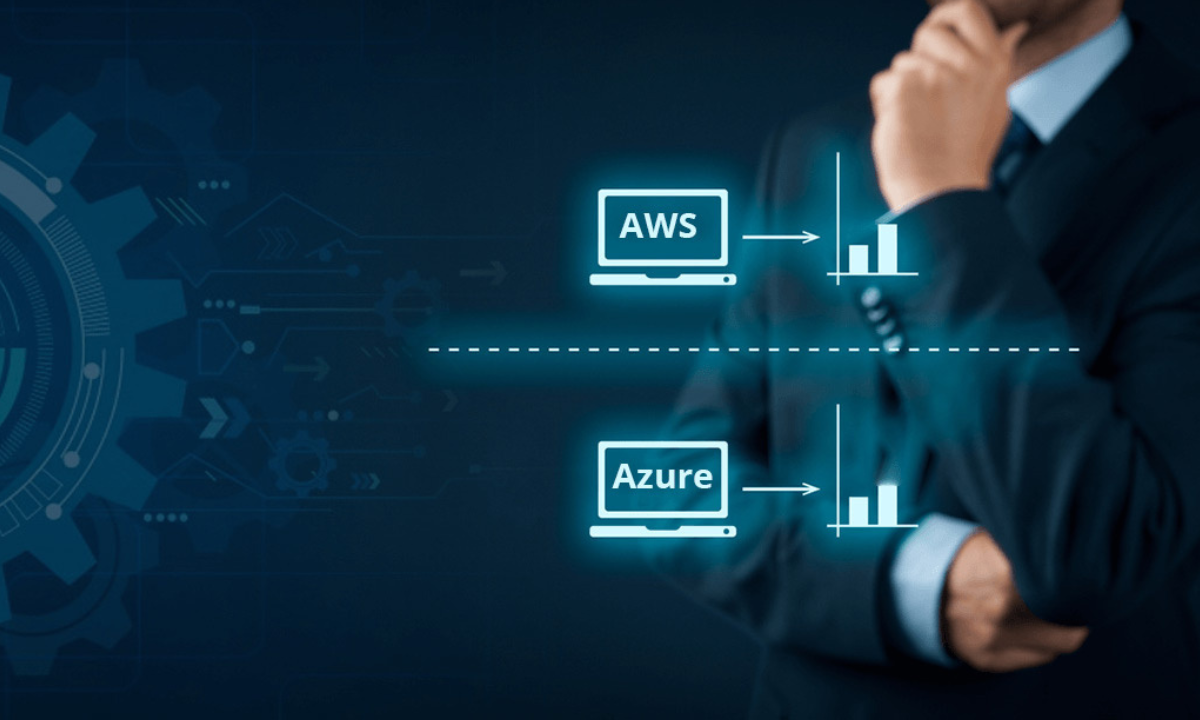When companies migrate to the cloud, the two names you will always hear are AWS and Azure. But which one fits your goals, skills, and long-term plans?
In this post, we will explain what AWS and Azure are. We will look at the differences between them. This will help you choose which platform you might like better.
This is helpful if you plan to take an AWS or Azure course. You will find it useful if you search for a training institute in Bangalore or seek certification. Curious which cloud gives you an edge? Read on.
---
What Is AWS and Azure?

AWS (Amazon Web Services) is Amazon's cloud platform. It provides many services, including computing, storage, networking, databases, and AI/ML. They launched it around 2006 and pioneered the public cloud model.
Azure is Microsoft’s cloud platform. It integrates deeply with Microsoft’s ecosystem (Windows Server, Active Directory, Office 365) and offers similar cloud services, compute, storage, analytics, AI, hybrid cloud, and beyond.
Together, they form two of the biggest players in global cloud adoption, each with strengths and trade-offs.
---
Differences Between AWS and Azure
Ecosystem & Integration
If your environment already uses Microsoft technologies (Windows Server, SQL Server, Active Directory, Office 365), Azure tends to integrate more seamlessly. Conversely, AWS is more agnostic and tends to appeal to mixed stacks, open source environments, and diverse cloud-native architectures.
Pricing & Billing Model
AWS generally uses an hourly pricing model, and you pay for what you provision. Azure, on the other hand, often charges per minute, which may offer more fine-grained billing.
Reserved instances, spot pricing, commitment plans, and savings plans exist on both platforms, so effective cost depends heavily on usage patterns.
Hybrid & On-Premises Support
Azure has a strong hybrid cloud story with Azure Stack, On-Prem integrations, and consistent identity management across cloud and local environments. AWS also supports hybrid models (e.g. Outposts), but Azure often gets credit for having more mature enterprise hybrids.
Services & Breadth
Both platforms offer an extensive catalog, compute, storage, databases, AI/ML, serverless, data analytics, etc. In many cases, they match each other’s service offerings.
Where they differ is in details: naming conventions, feature maturity, region availability, performance optimizations, default security, and integrations with their own ecosystems.
Learning Curve & Developer Experience
For beginners or those with Microsoft backgrounds, Azure may feel easier to learn, especially if you're familiar with Windows, PowerShell, .NET, or Microsoft management tools.
AWS has a steeper curve because of the sheer volume of services and flexibility, but that also gives you more depth and power as you grow.
Certification & Career Demand
Certifications validate your expertise. AWS certifications (Solutions Architect, DevOps Engineer, etc.) are well-known and broadly recognized. Azure certification paths (Azure Administrator, Solutions Architect, Developer) carry strong weight, especially in Microsoft-oriented organizations.
Because many enterprises build on Microsoft stacks, Azure certs are especially valuable in those domains. But globally, AWS still often commands a slightly broader adoption.
---
AWS vs Azure: Which Is Easier to Learn?
This depends largely on your background:
-
If you already use Microsoft services and Windows tooling, Azure may feel more approachable.
-
If you're comfortable with Linux, open source tools, or general cloud concepts, AWS’s flexibility might appeal.
The “easiest” is subjective; what matters is consistent practice, real projects, and guided training.
---
How to Choose: AWS or Azure?
Here are criteria to help you decide:
1. Your Target Job or Ecosystem
If you aim for enterprises that heavily use Microsoft products, Azure may give you an edge. If you want variety and exposure across tech stacks, AWS may be more versatile.
2. Learning Resources & Training
Check what your training institute (for example, an AWS and Azure training center in Bangalore) offers. If they support both with good faculty and labs, you can even try both and then specialize.
3. Hands-On Experience
Start small with free tiers on both platforms. Try deploying a VM, setting up storage, running a function, and monitoring. Real work often clarifies which feels better for you.
4. Certification Strategy
Choose your certification path early and align your learning accordingly. E.g. AWS Certified Solutions Architect vs Microsoft Certified: Azure Solutions Architect.
5. Long-Term Vision
Think about growth into data, AI, DevOps, multi-cloud. Both platforms offer paths, but your momentum will come from skills, not just choice.
---
How AWS and Azure Training & Certification Bring Value
AWS and Azure Course
A structured AWS and Azure course covers fundamentals, hands-on labs, architecture best practices, security, deployment models, and cost management. Having practical exposure alongside theory builds confidence.
AWS and Azure Certification
Achieving certification helps validate your skill. Employers often filter candidates by recognized credentials. Doing both (or even dual tracks) can differentiate you.
Cloud Computing Training Course
A broader Cloud Computing Training Course may include AWS, Azure, GCP, hybrid cloud, containers, DevOps, and more. This gives you perspective and flexibility.
Training Institute in Bangalore
If you're in Bangalore, choose a training institute like Apponix that offers AWS & Azure curriculum, lab access, project work, and placement support. A strong local institute helps you network locally and prepare for real-world roles.
---
Making Your Move: Steps to Get Started
-
Register for free tiers on AWS and Azure and deploy your first service (e.g. VM or storage).
-
Follow an AWS and Azure course in Bangalore or online with hands-on labs.
-
Pick a certification goal (associate-level) and structure your study plan.
-
Build mini projects: web app deployment, backup automation, serverless function, or data analytics pipeline.
-
Document your learning: GitHub repos, blog posts, walkthroughs.
-
Connect with the cloud community, meetups, forums, and Bangalore tech groups to stay updated.
Final Thoughts
Choosing between AWS and Azure is less about finding the “best” cloud and more about aligning with your career goals, existing skills, and the kind of organizations you want to work with.
Both platforms are industry leaders, both offer rewarding certification paths, and both can open doors to exciting opportunities in cloud computing. The smartest move is to start exploring, get hands-on practice, and commit to continuous learning.
Whether you build expertise in AWS, Azure, or both, the demand for cloud professionals is only set to grow,
Start your cloud computing journey today by enrolling yourself in a cloud computing training course at Apponix
---
Frequently Asked Questions (FAQs)
Q1: AWS and Azure – are they the only cloud platforms?
No. There’s also Google Cloud Platform (GCP), IBM Cloud, Oracle Cloud, etc. But AWS and Azure dominate market share and have broad enterprise use cases.
Q2: Can you learn both AWS and Azure at the same time?
Yes—foundations overlap (compute, storage, networking). You can begin with one and gradually explore the other. Training courses often offer comparative modules.
Q3: Which certification is better, AWS or Azure?
There is no absolute “better.” It depends on your target domain, region, and job prospects. You can also pursue both to diversify your skillset.
Q4: Does mastering one cloud limit job options?
Not really—many roles value you deeply knowing one cloud. But cross-cloud or multi-cloud capabilities are increasingly desirable.
Q5: How much time does it take to become proficient in AWS or Azure?
With consistent effort (say, 3–6 months of regular work, labs, certification prep), you can gain a solid foundation. Deep expertise will evolve from real projects.




